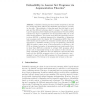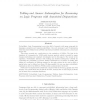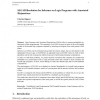28 search results - page 2 / 6 » A Comparative Study of Well-Founded Semantics for Disjunctiv... |
KR
2004
Springer
13 years 10 months ago
2004
Springer
Disjunction is generally considered to add expressive power to logic programs under the stable model semantics, which have become a popular programming paradigm for knowledge repr...
RR
2010
Springer
13 years 3 months ago
2010
Springer
Defeasible reasoning has been studied extensively in the last two decades and many different and dissimilar approaches are currently on the table. This multitude of ideas has made...
AMAI
2007
Springer
13 years 5 months ago
2007
Springer
Abstract. Partial equilibrium logic (PEL) is a new nonmonotonic reasoning formalism closely aligned with logic programming under well-founded and partial stable model semantics. In...
ICLP
2010
Springer
13 years 8 months ago
2010
Springer
Probabilistic Logic Programming is an active field of research, with many proposals for languages, semantics and reasoning algorithms. One such proposal, Logic Programming with A...
FUIN
2010
13 years 3 months ago
2010
Abstract. Logic Programs with Annotated Disjunctions (LPADs) allow to express probabilistic information in logic programming. The semantics of an LPAD is given in terms of the well...



